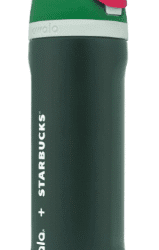 Scottish start-up POTR has developed the world’s first fully traceable and eco-friendly plant pot made from recycled marine plastic.
Scottish start-up POTR has developed the world’s first fully traceable and eco-friendly plant pot made from recycled marine plastic.
The Ocean Pot created by the Glasgow-based firm is produced entirely from discarded fishing gear recovered from UK coastlines in part. Each pot features a QR code that links the product to the specific beaches and harbours where the material was recovered.
This initiative comes amid growing concerns over marine pollution in Scotland. A study by the UK’s Department for Environment, Food & Rural Affairs (Defra) found that Scotland generates significantly more plastic waste from the fishing and aquaculture industry than England – an estimated 4,897 tonnes annually compared to 1,108 tonnes.
The Ocean Pot, made from recycled marine plastic, is manufactured through a UK-wide supply chain. Fishing nets are recovered, sorted and shredded by Cornwall-based marine waste specialists Waterhaul – with POTR being the first adopters of Waterhaul’s recently launched Traceable Marine Plastic material. It is then pelletised in Dumfries, transformed into recycled sheets in Middlesbrough, and finally die-cut and assembled in Edinburgh.
Andrew Flynn, POTR’s founder and a lecturer at Glasgow School of Art, was inspired to create the Ocean Pot after witnessing the extent of marine waste on Scotland’s west coast.
He said: “I was in Skye recently, and while it’s one of the most beautiful places in the world, the amount of marine waste on the west coast is staggering. Waste is choking our shoreline – Surely there is something that can be done to make it useful.
“We’re huge admirers of Waterhaul and the work they do, and to partner with them is a major step forward. Traceability makes it real for people. The more transparent the journey, the more it sparks conversations and makes people realise they can be part of the solution.”
The Ocean Pot’s origami-inspired design allows it to be shipped flat-packed, reducing transport emissions by up to 100 times compared to traditional ceramic or plastic pots. Once unfolded, a self-watering system using cotton cord helps plants regulate hydration with minimal waste.
POTR’s initial Ocean Pot release in 2022 sold out quickly, but scaling production proved challenging due to fragmented supply chains. The new partnership with Waterhaul, specialists in recovering, recycling and manufacturing adventure products from marine plastic in the UK, enables POTR to meet growing demand.
Harry Dennis, co-founder of social enterprise Waterhaul, said: “Ghost gear is the most damaging form of plastic in the sea. Working with POTR means we can take that material and turn it into something useful, something beautiful, something people want in their homes.
“They care about the process as much as the product. These pots are traceable back to the beach the net came from. That level of transparency matters. It shows what’s possible
“This could easily be one of the most efficient recycling-to-product models in UK consumer manufacturing.”
Customers can scan their Ocean Pot to view when and where the net was collected, the volume of waste in that batch, and who sorted it. The data is stored on Waterhaul’s live tracking platform, and every pot contributes 4% of profits to ongoing clean-up efforts.
Each tonne of beach waste now yields approximately 5,500 Ocean Pots.
Since its founding in 2019, POTR has shipped to over 50 countries and secured retail partnerships with Uncommon Goods, John Lewis, and Bloom & Wild. The new Ocean Pot, its most advanced product to date, will be showcased at this year’s Chelsea Flower Show and at V&A Dundee as part of the new Garden Futures exhibition, which opens to the public from Saturday 17th May.
The Ocean Pot will be available for purchase from Friday 16 May priced from £22, exclusively via www.potr.co.







